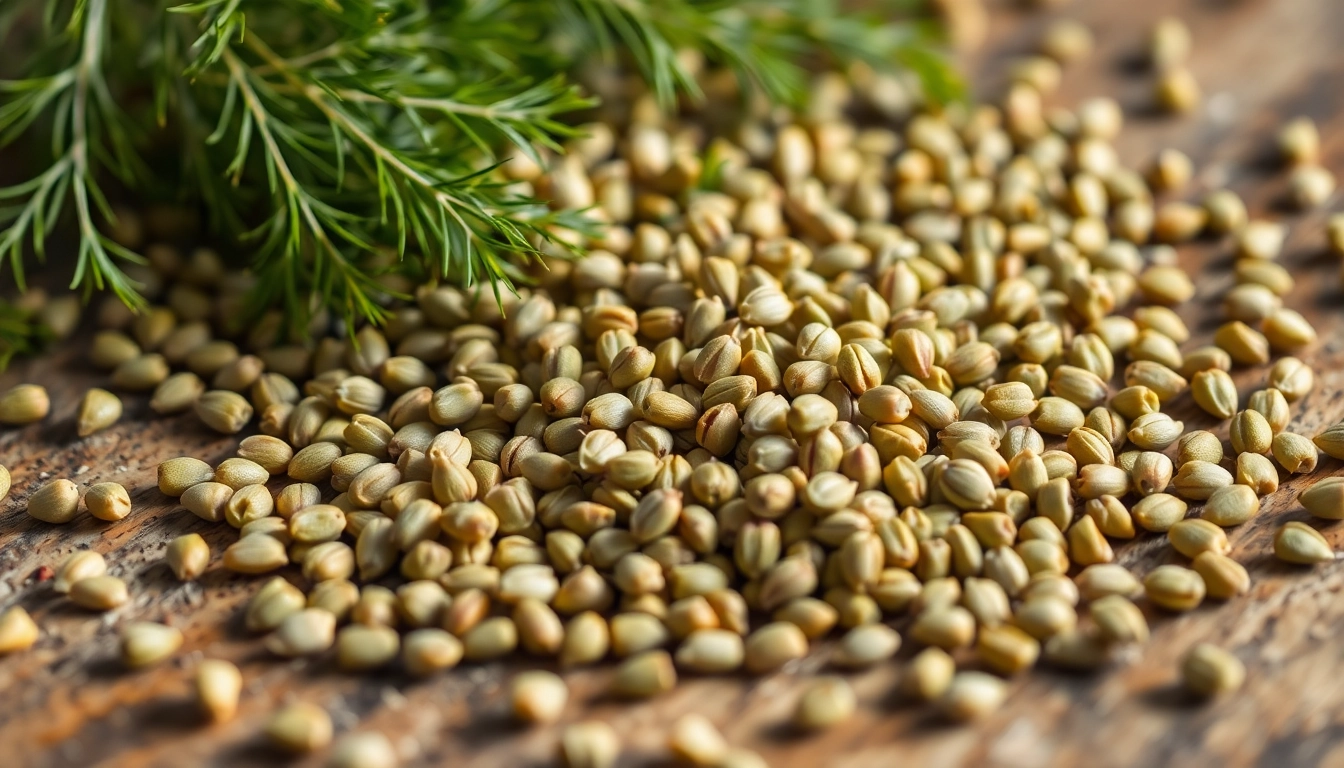Unlocking the Potential of Dill Seeds: A Comprehensive Guide to Their Culinary and Health Benefits
In the vast world of herbs and spices, few ingredients possess the versatility and health-promoting properties of Dill Seeds. Known for their distinct aroma and rich flavor profile, dill seeds are a culinary mainstay in numerous cuisines worldwide. Beyond their culinary appeal, they are treasured for their potent health benefits, making them an essential ingredient for health-conscious consumers and professional chefs alike. As a leading manufacturer and exporter of authentic spice products, Spice Nest proudly offers high-quality dill seeds that meet international standards, ensuring both flavor and safety for end-users.
Understanding Dill Seeds: Origins, Varieties, and Nutritional Value
Historical Background and Cultural Significance
Dill seeds originate from the ancient regions of Egypt and the Mediterranean, where they have been cultivated and used for over 4,000 years. Historically, dill was revered in Egyptian, Greek, and Roman civilizations, often associated with health and protection. Its seeds found their way into traditional medicine and culinary practices, symbolizing vitality and wellness. In India, particularly in regions like Gujarat, dill seeds (known locally as ‘sowa’) are integral to spice blends and Ayurvedic formulations, underscoring their cultural importance.
Different Types of Dill Seeds and Their Unique Profiles
While most commercial dill seeds are standardized, slight variations exist depending on cultivar and growing conditions. The most common type is the European dill (Anethum graveolens), renowned for its aromatic, slightly sweet flavor. In contrast, Indian variants tend to have a more robust, slightly spicy profile suitable for regional cuisines like Rajasthani and Gujarati dishes. High-quality dill seeds are characterized by their uniform size, dark greenish-brown color, and fresh aroma. Ensuring the purity and authenticity of dill seeds is crucial for maintaining flavor integrity and health benefits.
Nutritional Benefits and Key Health Advantages
Dill seeds are a powerhouse of nutrients including essential oils, antioxidants, vitamins, and minerals. They are rich in dietary fiber, calcium, magnesium, iron, and manganese, contributing to their numerous health benefits. Scientific studies confirm that dill seeds possess anti-inflammatory, antimicrobial, antispasmodic, and digestive properties. Regular consumption can aid digestion, improve immunity, and detoxify the body. Their antioxidant content helps combat free radicals, potentially reducing the risk of chronic diseases like cardiovascular ailments and certain cancers.
Effective Ways to Incorporate Dill Seeds into Your Cuisine
Popular Recipes Featuring Dill Seeds
Dill seeds are a staple in pickles, curries, and spice blends. They add depth to dishes like Indian chicken curry, Mediterranean bean salads, or Scandinavian gravlax. For example, a classic Rajasthani Roti or Gujarati Kadhi can be elevated using toasted dill seeds. Incorporating dill seeds in bread dough, seasoning marinades, or forming part of dry spice mixes like garam masala enhances both aroma and flavor.
Cooking Tips to Balance Dill Seeds’ Aroma and Taste
To maximize flavor, it is advisable to roast dill seeds lightly before grinding or adding them directly to dishes. Toasting releases their essential oils, intensifying aroma. For delicate recipes, adding dill seeds towards the end of cooking preserves their subtle flavor. When used in spice blends, blending with coriander and cumin creates a balanced profile that complements various meats and vegetables.
Using Dill Seeds in Spice Blends and Herbal Infusions
Integrating dill seeds into custom spice mixes can add versatility. Combine with fennel, fenugreek, and mustard seeds to create regional blends. For herbal infusions, steep crushed dill seeds in hot water or oils to extract their aromatic oils, which can then be used for salad dressings, pickling solutions, or massage oil formulations. Such infusions carry the beneficial properties of dill seeds and elevate culinary and wellness applications.
Buying, Storing, and Ensuring Quality of Dill Seeds
Choosing High-Quality Dill Seeds
Opt for premium, certification-backed dill seeds that display uniform size, vibrant color, and a fresh, aromatic scent. Trusted manufacturers like Spice Nest guarantee adherence to international quality standards and certification requirements such as ISO, HACCP, and Organic certifications. Always check for freshness and avoid seeds that are discolored or have an off smell, as these indicate poor storage or age.
Best Practices for Storing Dill Seeds
To maintain potency, store dill seeds in airtight containers, away from direct sunlight, heat, and moisture. An ideal storage environment is a cool, dark pantry or cellar. Proper packaging preserves the essential oils responsible for flavor and health benefits, extending shelf life up to 12 months or more. For bulk storage, use food-grade, vacuum-sealed packages to prevent contamination and preserve freshness.
Certifications and Quality Standards
Leading manufacturers like Spice Nest supply dill seeds that are certified organic, ISO-compliant, and meet export standards. Certifications assure consumers of product purity, safety, and adherence to sustainable farming practices. These standards are crucial for food manufacturers, exporters, and health-conscious buyers seeking reliable and trustworthy products.
Leveraging Dill Seeds for Health and Wellness
Dill Seeds for Digestion, Immunity, and Detoxification
Traditionally, dill seeds have been used to treat indigestion, colic, and bloating. Their carminative properties help relax the stomach muscles, easing gas and discomfort. The essential oils exhibit antimicrobial activity, supporting immune health. Regular inclusion of dill seeds in diet can aid detoxification by stimulating bile flow, improving digestion, and flushing out toxins.
Incorporating Dill Seeds into Holistic Health Routines
Adding dill seed infusions or powder to daily smoothies, herbal teas, or warm water with honey is an effective way to harness their benefits. For holistic health, combine dill seeds with other herbs like turmeric or cumin to create potent herbal remedies. Additionally, dill seed oil, extracted through cold pressing, can be used topically in massage oils for relaxation and anti-inflammatory effects.
Scientific Studies Supporting Dill Seeds’ Health Benefits
Recent research underscores dill seeds’ antioxidant compounds, including flavonoids and phenolic acids, which contribute to their anti-inflammatory and antimicrobial activities. Clinical trials highlight their efficacy in improving digestive health and reducing oxidative stress, validating traditional claims. The presence of volatile oils like carvone and limonene further supports their role in promoting overall well-being.
Market Trends and Buying Guide for Dill Seeds in 2025
Current Demand and Consumer Preferences
The global organic and natural foods movement has significantly increased demand for pure, organic dill seeds. Consumers prioritize quality, certification, and provenance. The trend toward clean-label products fuels interest in sustainably sourced, chemical-free dill seeds that can be trusted for both culinary and medicinal use. Health-conscious demographics seek dill seeds infused in herbal teas, wellness supplements, and functional foods.
Top Exporters and Manufacturers of Dill Seeds
India, particularly Gujarat and Rajasthan, is among the leading global exporters, supported by companies like Spice Nest that combine high standards with competitive pricing. Other key exporters include Egypt, Iran, and Russia. Quality certifications and adherence to international export standards give Indian manufacturers an edge in the global market.
Pricing, Bulk Purchasing Options, and Sourcing Tips
Depending on quality, certification, and grade, dill seed prices vary from $3 to $7 per kilogram in international markets. Buyers should prioritize suppliers offering organic certification, traceability, and consistent quality. Bulk purchasing from reputable manufacturers ensures cost-effectiveness and supply security. Establishing long-term partnerships facilitates quality control and access to innovations in spice processing.



